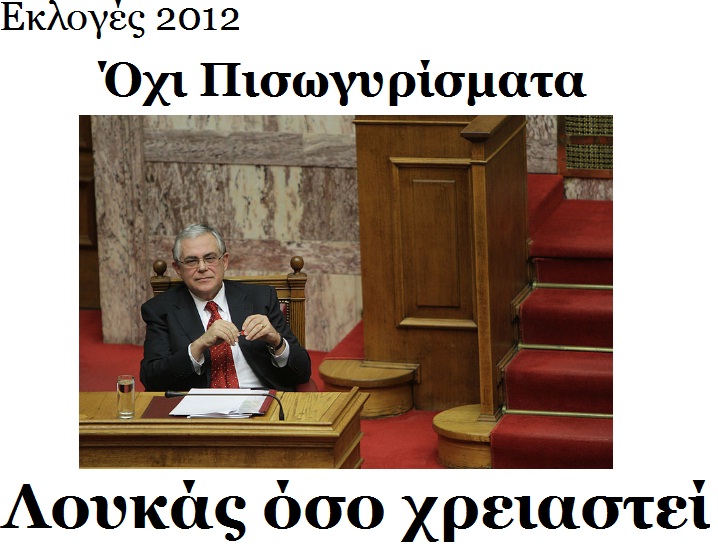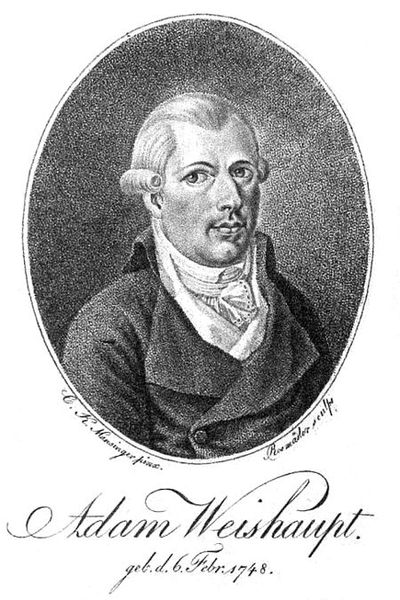<Back to Index>
- Philosopher Johann Adam Weishaupt, 1748
- Writer Irmgard Keun, 1905
- Prime Minister of Italy Amintore Fanfani, 1908
PAGE SPONSOR


Johann Adam Weishaupt (February 6, 1748 in Ingolstadt – November 18, 1830 in Gotha) was a German philosopher and founder of the Order of Illuminati, a secret society with origins in Bavaria.
Adam Weishaupt was born on February 6, 1748 in Ingolstadt in the Electorate of Bavaria. Weishaupt's father Johann Georg Weishaupt (1717 – 1753) died when he was five years old. After his father's death he came under the tutelage of his godfather Johann Adam Freiherr von Ickstatt who, like his father, was a professor of law at the University of Ingolstadt. Ickstatt was a proponent of the philosophy of Christian Wolff and of the Enlightenment, and he influenced the young Weishaupt with his rationalism. Weishaupt began his formal education at age seven at a Jesuit school. He later enrolled at the University of Ingolstadt and graduated in 1768 at age 20 with adoctorate of law. In 1772 he became a professor of law. The following year he married Afra Sausenhofer of Eichstätt.
After Pope Clement XIV’s suppression of the Society of Jesus in 1773, Weishaupt became a professor of canon law, a position that was held exclusively by the Jesuits until that time. In 1775 Weishaupt was introduced to the empirical philosophy of Johann Georg Heinrich Feder of the University of Göttingen. Both Feder and Weishaupt would later become opponents of Kantian idealism.
“ At
a time, however, when there was no end of making game of and abusing
secret societies, I planned to make use of this human foible for a real
and worthy goal, for the benefit of people. I wished to do what the
heads of the ecclesiastical and secular authorities ought to have done
by virtue of their offices ... ”
On May 1, 1776 Weishaupt formed the "Order of Perfectibilists". He adopted the name of "Brother Spartacus" within the order. Though the Order was not egalitarian or democratic, its mission was the abolition of all monarchical governments and state religions in Europe and its colonies. Weishaupt wrote: "the ends justified the means." The actual character of the society was modeled on the Jesuits, and was an elaborate network of spies and counter-spies. Each isolated cell of initiates reported to a superior, whom they did not know, a party structure that was effectively adopted by some later groups.
Weishaupt was initiated into the Masonic Lodge "Theodor
zum guten Rath", at Munich in 1777. His project of "illumination,
enlightening the understanding by the sun of reason, which will dispel
the clouds of superstition and of prejudice" was an unwelcome reform. Soon however he had developed gnostic mysteries
of his own, with the goal of "perfecting human" nature through
re-education to achieve a communal state with nature, freed of
government and organized religion. He began working towards
incorporating his system of Illuminism with that of Freemasonry. He
wrote: "I did not bring Deism into Bavaria more than into Rome. I found it here, in great vigour, more abounding than in any of the neighboring Protestant States.
I am proud to be known to the world as the founder of the Illuminati."
Weishaupt's
radical rationalism and vocabulary was not likely to succeed. Writings
that were intercepted in 1784 were interpreted as seditious, and the
Society was banned by the government of Karl Theodor, Elector of Bavaria, in 1784. Weishaupt lost his position at the University of Ingolstadt and fled Bavaria.
He received the assistance of Duke Ernest II of Saxe-Gotha-Altenburg (1745 – 1804), and lived in Gotha writing a series of works on illuminism, including A Complete History of the Persecutions of the Illuminati in Bavaria (1785), A Picture of Illuminism (1786), An Apology for the Illuminati (1786), and An Improved System of Illuminism (1787). Adam Weishaupt died in Gotha on 18 November 1830. He was survived by his second wife, Anna Maria (née Sausenhofer), and his children Nanette, Charlotte, Ernst, Karl, Eduard, and Alfred. Weishaupt was buried next to his son Wilhelm who preceded him in death in 1802.
John Robison, a professor of natural philosophy at Edinburgh University in Scotland and a member of a Freemason Lodge there, said he had been asked to join the Illuminati. After consideration he concluded that the Illuminati were not for him. In 1798 he published a book called Proofs of a Conspiracy in which he wrote: "An association has been formed for the express purposes of rooting out all the religious establishments and overturning all existing governments ... the leaders would rule the World with uncontrollable power, while all the rest would be employed as tools of the ambition of their unknown superiors." This book was sent to George Washington, who replied:
- It was not my intention to doubt that, the Doctrines of the Illuminati, and principles of Jacobinism had not spread in the United States. On the contrary, no one is more truly satisfied of this fact than I am. The idea that I meant to convey, was, that I did not believe that the Lodges of Free Masons in this Country had, as Societies, endeavoured to propagate the diabolical tenets of the first, or pernicious principles of the latter (if they are susceptible of separation).
- An enthusiastic philanthropist. He is among those... who believe in the indefinite perectiblity of man. He thinks he may in time, be rendered, so perfect, that he will be able to govern himself in every circumstance...—Thomas JeffersonWeishaupt believes that to promote this perfection of the human character was the object of Jesus Christ. That his intention was simply to reinstate natural religion, & by diffusing the light of his morality, to teach us to govern ourselves. His precepts are the love of God & love of our neighbor. And by teaching innocence of conduct, he expected to place men in their natural state of liberty & equality. He says, no one ever laid a surer foundation for liberty than our grand master, Jesus of Nazareth. He believes the Free masons were originally possessed of the true principles & objects of Christianity, & have still preserved some of them by tradition, but much disfigured. The means he proposes to effect this improvement of human nature are "to enlighten men, to correct their morals & inspire them with benevolence. Secure of our success, sais he, we abstain from violent commotions. To have foreseen, the happiness of posterity & to have prepared it by irreproachable means, suffices for our felicity. The tranquility of our consciences is not troubled by the reproach of aiming at the ruin or overthrow of states or thrones." As Weishaupt lived under the tyranny of a despot & priests, he knew that caution was necessary even in spreading information, & the principles of pure morality. He proposed therefore to lead the Free masons to adopt this object & to make the objects of their institution the diffusion of science & virtue. He proposed to initiate new members into his body by gradations proportioned to his fears of the thunderbolts of tyranny. This has given an air of mystery to his views, was the foundation of his banishment, the subversion of the masonic order, & is the colour for the ravings against him of Robinson, Barruel & Morse, whose real fears are that the craft would be endangered by the spreading of information, reason, & natural morality among men. This subject being new to me, I have imagined that if it be so to you also, you may receive the same satisfaction in seeing, which I have had in forming the analysis of it: & I believe you will think with me that if Wishaupt had written here, where no secrecy is necessary in our endeavors to render men wise & virtuous, he would not have thought of any secret machinery for that purpose.—Thomas Jefferson
Adam Weishaupt is referred to repeatedly in The Illuminatus! Trilogy, written by Robert Shea and Robert Anton Wilson, as the founder of the Bavarian Illuminati and as an imposter who killed George Washington and took his place as the first president of the United States. Washington's portrait on the one-dollar bill is said to actually be Weishaupt's.
Another version of Adam Weishaupt appears in the extensive comic book-cum-novel Cerebus the Aardvark by Dave Sim, as a combination of Weishaupt and George Washington. He appears primarily in the Cerebus and Church & State I volumes. His motives are republican confederalizing of city-states in Estarcion (a pseudo-Europe) and the accumulation of capital unencumbered by government or church.
Weishaupt is also mentioned among the mish-mash of complicated conspiracies in the PC game Deus Ex. During JC Denton's escape from Versalife labs in Hong Kong, he recovers a virus engineered with the molecular structure in multiples of 17 and 23. Tracer Tong notes "1723... the birthdate of Adam Weishaupt" Weishaupt was in fact born in 1748. However 1723 was the year that Weishaupt's freemasonry lodge, "Theodor zum guten Rath", was founded.
Adam Weishaupt is also mentioned ("Bush got a ouija to talk to Adam Weishaupt") by the New York rapper Cage in El-P's "Accidents Don't Happen", the ninth track on his album Fantastic Damage (2002).